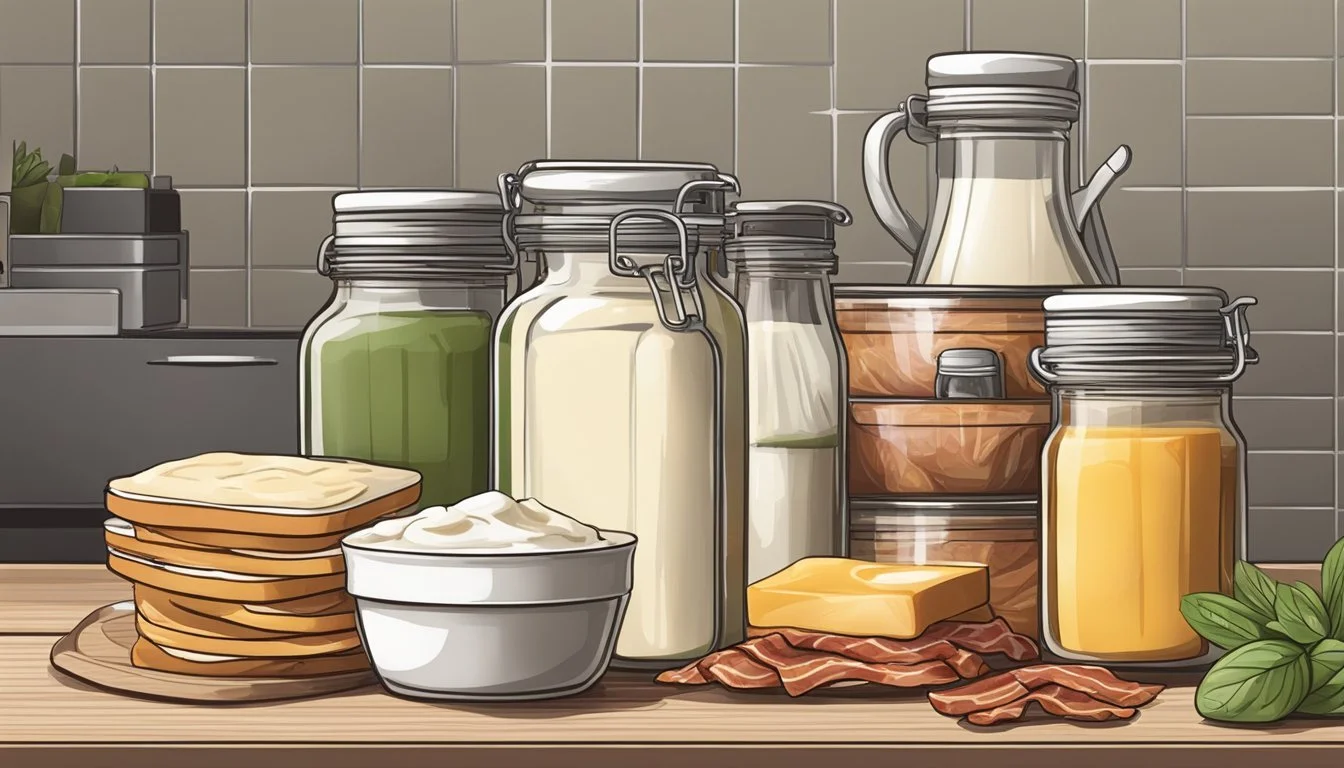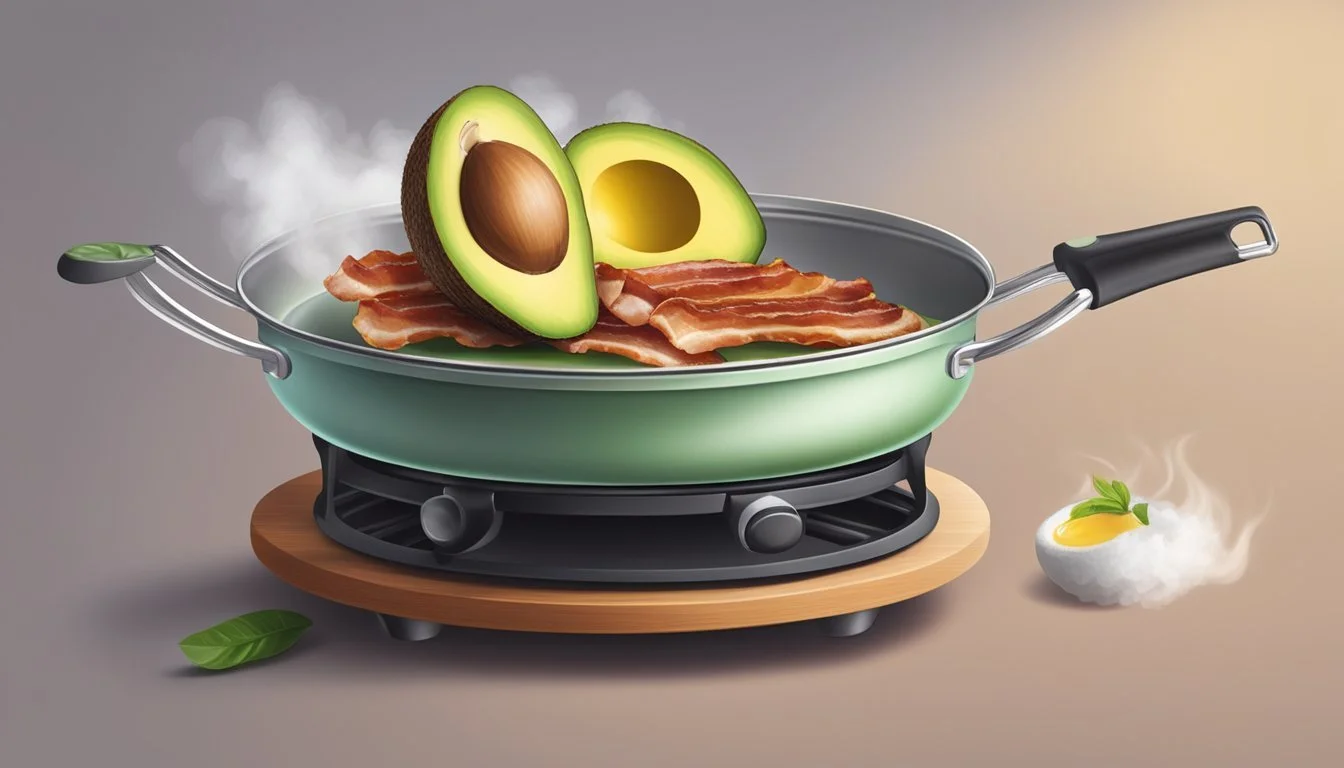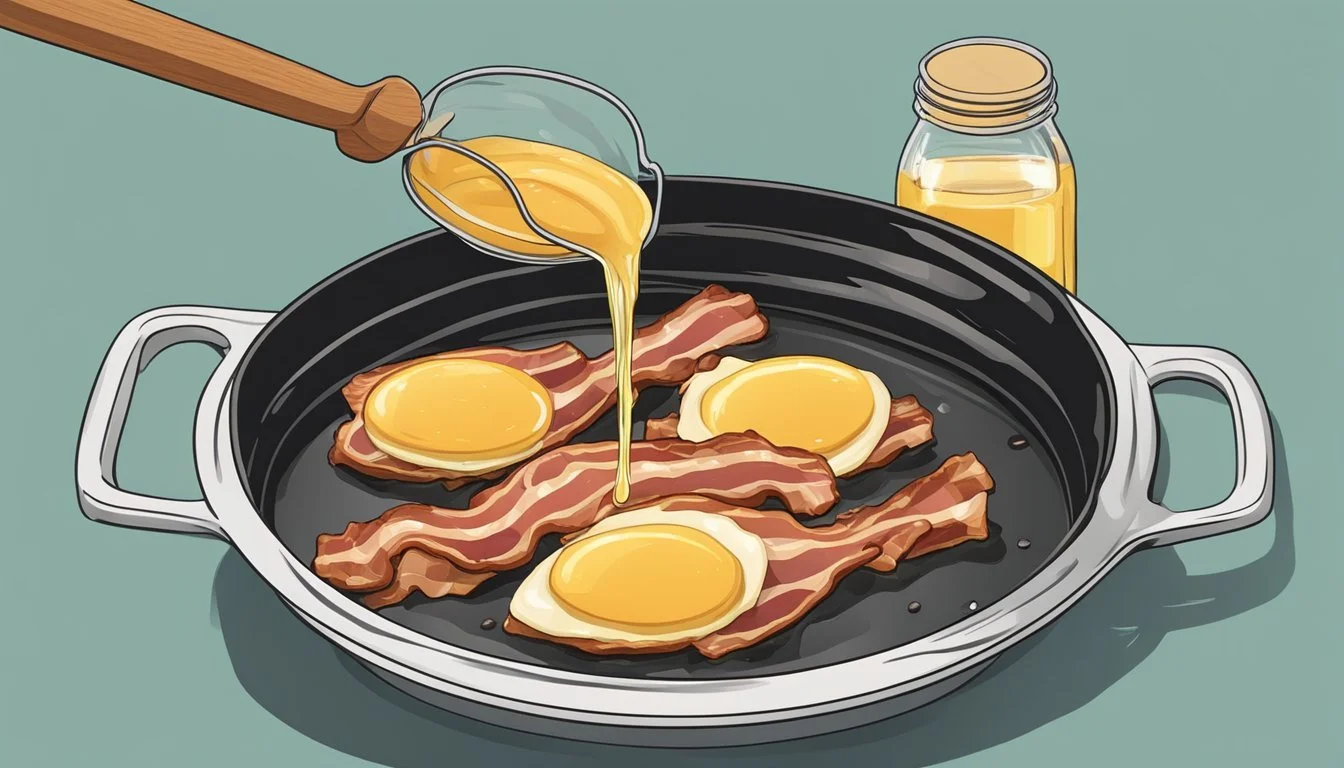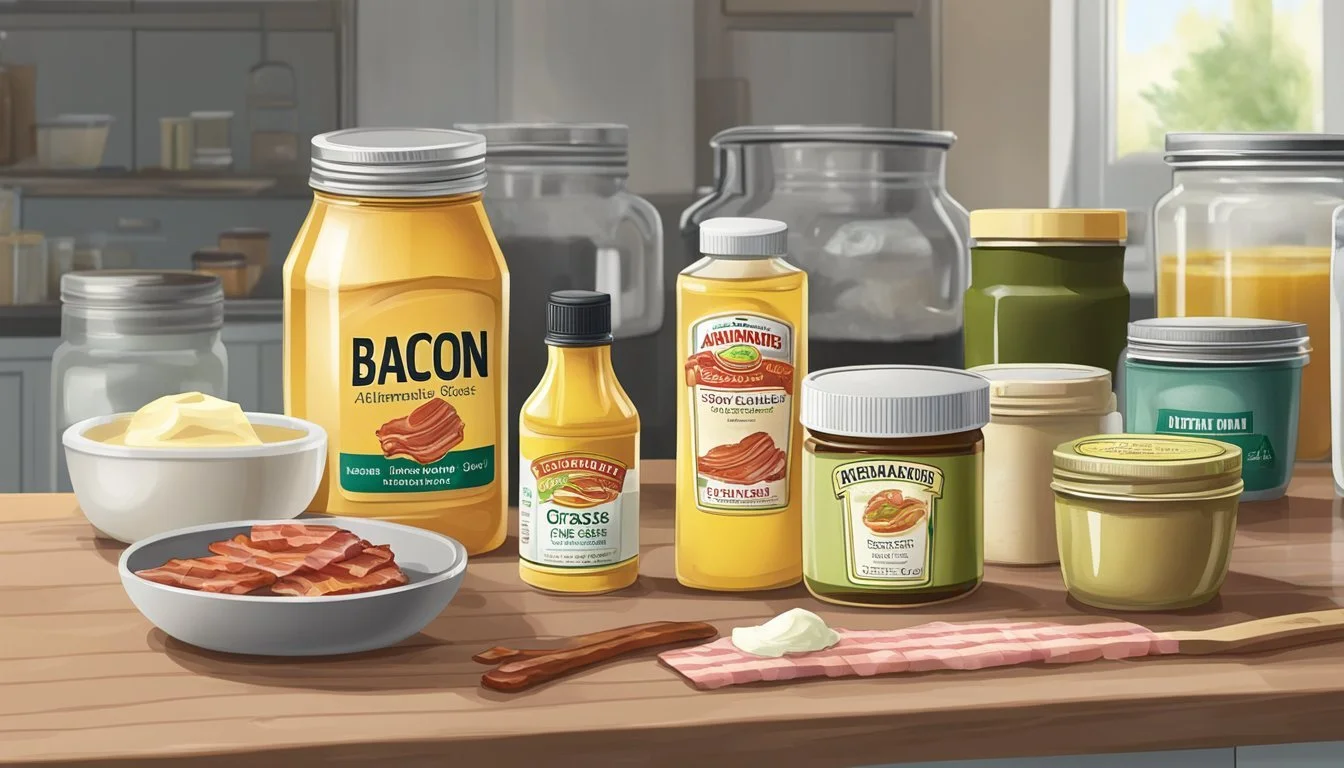Bacon Grease Substitutes
Top Alternatives for Cooking and Baking
Bacon grease is a distinctive ingredient, cherished for its rich flavor and versatility in cooking. Traditionally used in a variety of dishes, from frying and sautéing to adding depth to soups and stews (What wine goes well with stews?), it can be a kitchen staple for many. However, health concerns, dietary preferences, or simply running out of it can necessitate finding a substitute for bacon grease that maintains the desired flavor and texture in dishes.
There are several suitable alternatives that cater to different cooking needs and dietary restrictions. For frying or sautéing, fats with high smoke points like butter for non-vegan options, or oils such as olive and peanut oil are often recommended. In baking, solid fats such as lard or vegetable shortening can replace bacon grease to provide the necessary fat content. For those who prefer a substitute that replicates the essence of bacon grease, options like beef fat or chicken fat can serve as excellent alternatives, offering a similar richness and texture.
With thoughtful consideration of the subtleties of flavor and the performance of fats in various cooking techniques, individuals can find suitable bacon grease substitutes that align with their culinary needs. Whether they are looking for a plant-based option or a more neutral taste profile, there is an array of alternatives available for home cooks and professional chefs alike to explore.
Understanding Bacon Grease
Bacon grease is a key component in many culinary traditions, revered for its ability to impart rich flavor and desirable texture to a variety of dishes.
What Is Bacon Grease?
Bacon grease, also known as bacon fat, is the fat rendered from bacon during the cooking process. When bacon is cooked, it releases fat, which can be collected and solidifies upon cooling. This rendered fat is used in various cooking applications because it retains the bacon's flavor and adds moisture to the food being cooked.
Flavor Profile
The flavor profile of bacon grease is distinctively savory and smoky, and it carries a level of richness that can enhance the overall taste of food. The flavor is robust, making it a sought-after ingredient for adding depth to dishes such as roasted vegetables, fried eggs, and baked goods.
Dairy-Based Substitutes
When seeking alternatives to bacon grease, dairy-based options such as butter and ghee provide rich flavors and textures suitable for a variety of cooking methods.
Butter and Ghee
Butter, a well-known kitchen staple, can seamlessly replace bacon grease. It imparts a creamy texture and rich flavor to dishes such as sautéed vegetables and baked goods. Ghee, or clarified butter, is butter that has been simmered to remove water content and milk solids, leaving behind a pure butterfat with a heightened nutty flavor. It has a higher smoke point than traditional butter, making it suitable for high-heat cooking.
Salted butter is suitable for dishes needing a slight salty profile.
Unsalted butter allows for more control over the seasoning of the dish and is preferable in baking.
Saturated Fat Content
It is important to consider the saturated fat content when substituting bacon grease with dairy products. Butter and ghee both contain saturated fats, which can impact the healthfulness of a dish.
Substitute Saturated Fat Content Bacon Grease High in saturated fats Butter High in saturated fats Ghee High, but may contain fewer milk solids
While not low in saturated fat, ghee results in a slightly different nutritional profile due to the removal of milk solids. It is often considered a better choice for those who are lactose intolerant.
Plant-Based and Vegan Alternatives
For those seeking to replace bacon grease in their cooking with plant-based options, several vegan alternatives provide the rich, satisfying flavors and cooking properties needed for a variety of dishes.
Olive and Avocado Oils
Olive oil is a staple in plant-based cooking, offering a monounsaturated fat content conducive for frying and sautéing. Its flavor ranges from fruity to robust, depending on the type and can enhance dishes that call for a subtle, earthy backdrop. Avocado oil presents a higher smoke point, making it ideal for high-heat cooking applications. Its mild taste ensures that it can be used across a broad spectrum of recipes without altering the original flavor profile.
Coconut Oil and Vegetable Shortening
Coconut oil provides a high-fat content suitable for recipes that require a rich texture, such as curries. Given its distinct tropical taste, one should consider the flavor compatibility with the dish being prepared. Vegetable shortening, on the other hand, is flavor-neutral and works well in baking, offering the desired flakiness in crusts without the presence of animal products.
Nutty Flavors from Seeds
Sesame oil infuses dishes with a nutty flavor and is commonly used in Asian cuisine. While distinctive, its strong flavor is best used sparingly. It pairs well with ingredients like tofu, providing a delectable crunchy layer that mimics the texture of bacon when fried. This oil delivers both flavor and function to plant-based recipes that necessitate a bacon grease substitute.
Vegan Bacon Grease
For a specifically engineered solution, one can find products labeled as vegan bacon grease. These are crafted to imitate the smoky, salty characteristics of traditional bacon grease without any animal byproducts, using a mixture of plant-based oils and umami-rich flavorings. They serve as direct substitutes in any application that would typically benefit from the original's taste and cooking properties.
Animal Fat Substitutes
When seeking alternatives to bacon grease, various animal fats can provide similar flavor profiles and cooking properties. These fats are essential for certain cooking methods and offer rich, savory notes to dishes.
Lard and Tallow
Lard, rendered from pork, is a traditional cooking fat with a high smoke point. In comparison to bacon grease, lard lacks the smoky flavor but can be enhanced with smoked salt to mimic that aspect. Tallow, rendered from beef or mutton, also serves as a robust alternative, providing a unique depth to dishes where a beefy essence is desired.
Lard: Neutral taste; suitable for frying and baking.
Tallow: Richer flavor; excellent for roasting and deep-frying.
Poultry-Based Fats
Chicken fat, also known as schmaltz, is deeply rooted in various cuisines for its savory qualities. With a good balance of richness and subtlety, it's ideal for sautéing, roasting, and as a base in gravies. Duck fat is another praised option, especially for achieving a crispy texture in roasted foods like potatoes, and for its use in French cuisine, such as duck confit.
Chicken Fat (Schmaltz): Semi-solid at room temperature; flavorful for cooking eggs or vegetables.
Duck Fat: High smoke point; lends a delicate, rich taste to dishes.
Exotic Fats: Goose, Duck, and Sheep
Fats from goose and sheep are less common but provide distinctive flavors to culinary applications. Goose fat is known for its use in traditional European recipes, while fat rendered from sheep can complement dishes with a gamier profile. Both should be used thoughtfully to enhance, rather than overwhelm, the primary ingredients.
Goose Fat: Deep, full-bodied flavor; used in classic pâtés and roasts.
Sheep Fat: Strong, distinct taste; best used in small quantities for a bold impact.
Oil Alternatives for High Heat Cooking
When seeking alternatives to bacon grease for high heat applications like deep frying, it's crucial to consider the smoke point of oils. Choosing an oil with a high smoke point ensures stability during cooking and better flavor retention.
Smoke Point Considerations
The smoke point of an oil, the temperature at which it begins to smoke and decompose, is a key factor in determining its suitability for high heat cooking. Oils with higher smoke points can be heated to a higher temperature before breaking down, which makes them ideal for methods such as deep frying.
Peanut Oil: With a smoke point around 450°F (232°C), peanut oil is excellent for deep frying due to its ability to retain stability under high heat. Its neutral flavor doesn't interfere with the taste of the food.
Sunflower Oil: Sunflower oil typically has a smoke point of approximately 440°F (227°C), making it another good option for high heat cooking. It's often praised for its light taste that won't overshadow the flavors of what one is cooking.
Table: Smoke Points of Various Oils
Oil Type Smoke Point Peanut Oil 450°F (232°C) Sunflower Oil 440°F (227°C)
These oils are not only suitable substitutes in terms of temperature resistance but also offer their own unique benefits, such as adding a subtle, barely discernible taste to dishes. This allows the natural flavors of the food to stand out, even in high-heat applications like deep frying.
Flavor Enhancers and Seasoning
When substituting bacon grease, maintaining the characteristic flavor is crucial. Seasonings that contribute saltiness and umami or replicate the smoky aroma can be critical.
Saltiness and Umami
To mimic bacon grease's inherent saltiness and rich umami taste, chefs can turn to soy sauce or smoked salt. Soy sauce is a versatile condiment that imparts umami, while smoked salt infuses dishes with a subtle smokiness. A judicious measure can mimic the depth of flavor that bacon grease would provide.
Soy Sauce: A tablespoon can enhance savory dishes without overwhelming other flavors.
Smoked Salt: Best used sparingly to avoid excessive saltiness.
Liquid Smoke and Smoked Salt
For dishes where the smoky flavor of bacon grease is desired, liquid smoke and smoked salt offer viable alternatives. They impart a similar essence to food that echoes the distinctive character of bacon.
Liquid Smoke: A few drops can imbue a deep, smoky flavor reminiscent of traditional bacon grease.
Smoked Salt: It adds both the smoke and the seasoning aspect that bacon grease would typically bring.
Remember, both liquid smoke and smoked salt should be used conservatively to prevent overpowering the dish.
Usage in Different Cuisines
When substituting bacon grease in various cuisines, the goal is to replicate or complement the savory and earthy qualities that it provides. Different cultures employ substitutes that bring depth and flavor to their respective culinary offerings.
Indian and Bangladeshi Cooking
In Indian and Bangladeshi cuisines, ghee is commonly used as a substitute for bacon grease. Ghee, or clarified butter, brings a rich, nutty flavor to dishes and is capable of sustaining high cooking temperatures, making it ideal for frying and sautéing. Its distinct flavor also contributes to the savory, aromatic, and sometimes smoky notes found in many South Asian dishes.
Key substitutes for bacon grease:
Ghee (clarified butter)
Mustard oil (for an earthy, pungent aroma)
Coconut oil (for a subtle sweetness)
Universal Applications
Across many types of cuisine, certain substitutes for bacon grease are broadly utilized due to their ability to closely mimic the fat's cooking properties and flavors.
For frying or sautéing:
Chicken fat
Duck fat
Butter, though one must be aware of its lower smoke point.
For roasting and baking:
Lard or olive oil provide savory richness.
Vegetable shortening is used for its neutral flavor and texture similar to bacon grease when baked.
The use of duck fat stands out for its versatility, delivering a savory flavor while roasting poultry or potatoes. It's also noteworthy for its ability to add depth to searing meats. Olive oil, while lighter, can enhance the flavor of spices and meats and is used not only in cooking but also as a finishing oil for salads and dips.
Advantages of Substituting Bacon Grease
When one substitutes bacon grease in cooking, they may gain health benefits and accommodate various dietary considerations. This section explores these advantages in detail.
Health Benefits
Substituting bacon grease can lead to improved health outcomes due to lower levels of saturated fats and cholesterol present in alternatives like vegetable oils. For example, olive oil is a commonly used substitute that provides beneficial monounsaturated fats which are known to support heart health.
Olive oil: Monounsaturated fats
Coconut oil: Contains medium-chain triglycerides (MCTs)
Switching to plant-based oils could also mean a higher intake of antioxidants and phytochemicals, which have various protective roles in the body. Such changes can contribute to a reduced risk of chronic diseases.
Dietary Considerations
Accommodating dietary preferences and restrictions is another advantage of using substitutes for bacon grease. For instance, those following a vegetarian or vegan diet might opt for plant-derived fats such as:
Coconut oil
Vegetable shortening
For individuals keeping kosher or halal, substitutes like beef fat or ghee respect dietary laws while still providing a rich flavor profile to dishes. Those avoiding pork products for personal or health reasons have ample alternative fats to choose from, ensuring that no one is left out from enjoying similar culinary experiences.
Recommended Applications
Selecting the right substitute for bacon grease depends on the cooking method and desired flavor profile. Each substitute has particular characteristics affecting the taste, texture, and aroma of the final dish.
Frying and Roasting
Frying: For a flavor similar to bacon grease, chicken skin grease or duck fat can be excellent choices; both offer a rich taste and are suitable for high-heat cooking. For a vegetable-based alternative, olive oil provides a distinct flavor, while peanut oil adds a nutty aroma to dishes like popcorn or stir-fries.
Chicken: Consider using chicken skin grease.
Popcorn: Olive oil or peanut oil can be used.
Roasting: To achieve crisp textures similar to bacon grease, use duck fat for roasting meats and vegetables. For vegetarian options, olive oil or vegetable shortening serves well, particularly for root vegetables.
Vegetables: Duck fat, olive oil, or vegetable shortening work well.
Baking and Pastries
Baking: In recipes such as biscuits, lard and vegetable shortening provide the necessary fat for flakiness, while butter can be used for its rich flavor. However, butter has a lower smoke point, making it less ideal for high-temperature baking.
Biscuits: Use lard, vegetable shortening, or butter.
Pastries: When creating pastries where a neutral flavor is desired, opt for vegetable shortening or butter at 82-86% fat content. Remember to adjust temperatures accordingly to prevent burning due to butter's lower smoke point.
Sauces, Soups, and Stews
Sauces: To enrich sauces or mayonnaise without bacon grease, ghee—a form of clarified butter—offers a high smoke point and rich flavor. Beef fat can give sauces a butter-like consistency with a different taste profile suitable for robust sauces.
Mayonnaise: Ghee is a suitable substitute.
Soups and Stews: For imparting depth to soups and stews, bacon itself or chicken fat can replace bacon grease to add richness without overwhelming the primary flavors.
Stews: Chicken fat complements well.
Soups: Use bacon or chicken fat.
Sautéing: When sautéing, substitutes like chicken fat or butter can provide the necessary fat content while adding a desirable flavor dimension to dishes like chicken or marinades.
Chicken: Sauté in chicken fat or butter.
Marinades: Consider using butter for a rich flavor.
To sum up, when looking for bacon grease substitutes, focus on the type of dish and the cooking process to select the best alternative. Whether it's for vegetarian dishes (What wine goes well with vegetarian dishes?) or meat-centric meals, there is a substitute that can closely match the properties of bacon grease to ensure a delicious outcome.
Expert Tips from Chefs
When replacing bacon grease, chefs often look for fats that can provide a similar depth of flavor and texture. They suggest considering the following substitutes:
Duck Fat: With its rich flavor, duck fat is an excellent alternative for roasting or frying. Chefs appreciate it for its higher content of monounsaturated and polyunsaturated fats.
Butter: For baking purposes, butter can add a delightful richness, although its lower smoke point means one must use it carefully to avoid burning.
Lard: Traditional and flavorful, lard is a go-to for many culinary experts aiming to maintain the heartiness of dishes.
Olive Oil: A more heart-healthy option, olive oil works well for sauteing and is celebrated for its versatility and the distinctive taste it lends to soups and stews.
Chefs recommend these plant-based alternatives particularly for those with dietary restrictions:
Coconut Oil: With a high smoke point, it's a viable option for frying.
Peanut Oil: Known for its neutral taste, it's suitable for cooking at high temperatures.
Substitute Use Case Chef’s Note Duck Fat Roasting, Frying "Ideal for a rich, savory flavor profile." Butter Baking "Watch the temperature; it burns easily." Lard General cooking "Great for flaky pastries." Olive Oil Sauteing, Soups, Stews "Adds a fruity note." Coconut Oil High-heat cooking "A stable fat for vegan dishes." Peanut Oil Frying, High-temperature "Won't interfere with food flavors."
They further emphasize the importance of matching the fat to the cooking method and knowing each fat's smoke point for optimal results.










